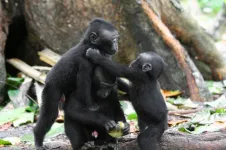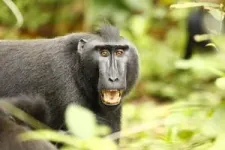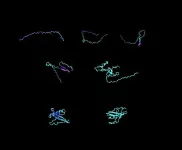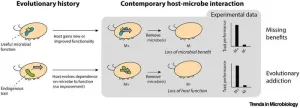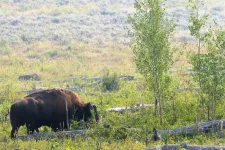(Press-News.org) When infants are involved in agonistic conflicts, male crested macaques (Macaca nigra) are more likely to respond to screams from their own offspring. This is the conclusion of a recent study led by behavioural ecologist Professor Anja Widdig from Leipzig University and the Max Planck Institute for Evolutionary Anthropology in Leipzig as part of the Macaca Nigra Project (MNP). The researchers studied the behaviour of crested macaques in the Tangkoko Nature Reserve on Sulawesi, Indonesia, over a 24-month period (2008 to 2010). A special issue of the “International Journal of Primatology” dedicated to these endangered animals has just been published. It marks the 17th anniversary of the Macaca Nigra Project.
Primate infants face many dangers. They are dependent on help to survive, especially in the first year of life. Mothers take on the main burden of parental care in primates. Because the survival of their offspring is essential for males too in order to pass on their genes, fathers can, for example, protect their offspring during conflicts. “Many primate species live in groups of several males and females. Promiscuous mating raises the question of whether males can even recognise their genetic offspring. The aim of this behavioural study was therefore to investigate how males respond when infants scream for help,” says Professor Widdig.
Her team observed conflicts involving infant crested macaques. The youngsters often scream in order to get support. In over 3,600 hours of observation in three study groups, the researchers registered over 2,600 infant screams for help. They then analysed the male crested macaques’ responses to the infants’ screams.
The researchers found that males were more likely to respond to an infant’s screams if they were the infant’s father, the infant’s friend and/or the mother’s friend. In addition, males were more likely to react to the screaming offspring if they themselves were of high dominance rank, i.e. likely sired many of these infants themselves, or if the screaming infant and its mother were of low dominance rank, i.e. particularly dependent on help. In contrast, whether males responded to infants’ screams did not depend on the presence of the mother at the conflict site.
The scientists concluded that male crested macaques may have some cues available to assess which infants they have sired. Despite this, males generally seem to intervene infrequently and even help unrelated infants. The data collected showed, for example, that infants who screamed for help were mainly involved in conflicts with adult males or females from their social group (42 and 46% respectively). Males may therefore assess the risk of their intervention in order to avoid potential conflicts with male rivals.
“Although previous studies on this primate species have found that fathers do not specifically establish social relationships with their offspring, this study shows that fathers do invest in supporting their offspring, albeit in a very limited way,” says Professor Widdig. She adds that this confirms the findings of other studies that males form social bonds with their offspring or tolerate their young at feeding sites, but rarely actively support their offspring in conflict situations. Based on their observations, the researchers believe that any form of paternal care is subtle and limited to certain situations, but may have evolved due to the high infant mortality in crested macaques.
There are several possible explanations for the paternal restraint: the simplest may be that crested macaque offspring just do not benefit from spatial associations and social bonds with their fathers, so neither fathers nor offspring invest in such relationships on a daily basis. Another explanation could be a lack of time. Although potentially beneficial, fathers might simply be unable to spend much time with their offspring. The time available for males to interact with their offspring appears to be severely limited, which the researchers attribute to the fact that crested macaques can only defend their alpha status for an average of twelve months. The males therefore probably invest all this time in mating with as many fertile females as possible before migrating to another group. “It is still unclear whether the support of young macaques by unrelated males is actually an active male strategy or a misjudgement of paternity by the male,” says the behavioural ecologist.
The Macaca Nigra Project (MNP) is an international collaboration established in 2006. Today, the MNP is led by scientists from Indonesia (Bogor Agricultural University), France (National Centre for Scientific Research and National Museum of Natural History, Paris), the United Kingdom (University of Portsmouth) and Germany (Leipzig University and Max Planck Institute for Evolutionary Anthropology, Leipzig).
The MNP operates a field station on Sulawesi, Indonesia, an island known as a biodiversity hotspot. The fieldwork is carried out in the Tangkoko Nature Reserve, which is located at the northernmost tip of Sulawesi and covers more than 8,700 hectares. Here, one of the largest remaining populations of the critically endangered crested macaques is being studied in its natural environment. The MNP focuses on research, environmental education and conservation. As well as studying the behaviour, physiology and ecology of this species, the project works with local authorities and non-governmental organisations to promote the conservation of these primates. Long-term data from around 500 animals in their natural environment, from birth to death, provides important insights into primate social evolution and behavioural ecology, as well as genetic diversity and inbreeding depression, ecology and climate change, highlighting the project’s interdisciplinary research approach.
The MNP has also attracted attention for its environmental education programmes. Since 2011, it has been organising activities to provide schoolchildren, teachers and adults from the villages around the Tangkoko Nature Reserve with information and resources about the rainforest, climate, water cycle, fauna, flora and crested macaques, in order to increase their knowledge about the protection of indigenous nature and biodiversity. The researchers have reached more than 5,000 people since the project began. The programme is part of the official school curriculum in two villages near the Tangkoko Nature Reserve. The Leipzig team also led the first quantitative analysis of the success of the environmental education programme, which is also featured in the special issue.
END
Male crested macaques more likely to respond to offspring screams recruiting support
Special issue of the “International Journal of Primatology ” marks 17th anniversary of Macaca Nigra project
2023-08-29
ELSE PRESS RELEASES FROM THIS DATE:
CDI study of fevers in children during COVID-19 raises further questions
2023-08-29
An uptick in fevers detected among children at more than two dozen hospitals in North America during COVID-19 highlights the question whether there are normally more autoinflammatory disorders such as recurrent fevers among children going overlooked in non-pandemic times, according to a new study by researchers including a CDI physician-scientist.
The paper “Increase in pediatric recurrent fever evaluations during the first year of the COVID-19 pandemic in North America” was published by Frontiers in Pediatrics on Aug. 3, and includes Sivia Lapidus, M.D., pediatric rheumatologist, Joseph M. Sanzari Children’s ...
Study sheds light on why breast cancer survivors don’t take their medications, and what can be done about it
2023-08-29
For roughly 80% of breast cancer survivors, treatment doesn’t end with surgery, radiation and chemotherapy. Instead, for the next five to 10 years, doctors recommend that they take medication to block sex hormones, which can fuel tumor growth and spark recurrence.
The drugs, no doubt, are life-saving: they’ve been shown to cut risk of cancer recurrence by as much as half in patients with hormone receptor-positive tumors (HR+)—the most common form of breast cancer. Yet despite their promised benefits, 40% of patients stop taking them early and a third take them less frequently than directed.
New CU ...
Neural network helps design brand new proteins
2023-08-29
WASHINGTON, August 29, 2023 – With their intricate arrangements and dynamic functionalities, proteins perform a plethora of biological tasks by employing unique arrangements of simple building blocks where geometry is key. Translating this nearly limitless library of arrangements into their respective functions could let researchers design custom proteins for specific uses.
In Journal of Applied Physics, from AIP Publishing, Markus Buehler of the Massachusetts Institute of Technology combined attention neural networks, often referred to as transformers, with graph neural ...
Some hosts have an “evolutionary addiction” to their microbiome
2023-08-29
We’ve long known that hosts malfunction without their microbiome—whether they are missing key microbial species or are completely microbe free. This malfunctioning is usually explained by the need for microbes to perform unique and beneficial functions, but evolutionary ecologist Tobin Hammer of the University of California, Irvine, is questioning that narrative.
In a peer-reviewed opinion article publishing August 29 in the journal Trends in Microbiology, Hammer argues that, in some cases, microbes might not actually be helping their hosts; instead, microbe-free hosts might malfunction because they have evolved an addiction to their microbes. ...
A lightweight wearable device helps users navigate with a tap on the wrist
2023-08-29
Scientists at Rice University in Houston, Texas have developed a fabric-based wearable device that “taps” a user’s wrist with pressurized air, silently helping them navigate to their destination. The study, published August 29 in the journal Device, demonstrated that users correctly interpreted which direction the device was telling them to go an average of 87% of the time. Since the wearable embeds most of its control system within the fabric itself, using air instead of electronics, it can be built lighter and more compact than existing designs.
“We envision this device will be used by individuals who need or desire information to be transmitted ...
Long-term maternal and child outcomes following postnatal SSRI treatment
2023-08-29
About The Study: The results of this study of 61,000 mother-child dyads suggest that postnatal selective serotonin reuptake inhibitor (SSRI) treatment was associated with a reduced risk of postnatal depression–associated maternal mental health problems and child externalizing behaviors across early childhood years. These findings suggest that postnatal SSRI treatment may bring benefits in the long term to women with postnatal depression and their offspring.
Authors: Chaoyu Liu, M.D., Ph.D., of King’s College in London, is the corresponding author.
To access the ...
Cannabis use disorder and reasons for use in a state where recreational cannabis use is legal
2023-08-29
About The Study: In this study of primary care patients in a state with legal recreational cannabis use, cannabis use disorder (CUD) was common among patients who used cannabis. Moderate to severe CUD was more prevalent among patients who reported any nonmedical use. These results underscore the importance of assessing patient cannabis use and CUD symptoms in medical settings.
Authors: Gwen T. Lapham, Ph.D., M.P.H., M.S.W., of the Kaiser Permanente Washington Health Research Institute in Seattle, is the corresponding author.
To access the embargoed study: Visit our For The Media website at this ...
#MedEd: How doctors use social media to advance medicine
2023-08-29
UNDER EMBARGO UNTIL 11:00 A.M. EDT ON TUESDAY, AUGUST 29, 2023
Social media’s effects on propagating misinformation among the lay public are widely debated, but a new paper from JAMA suggests physicians using social media are revolutionizing medical education.
La Jolla, Calif. (August 29, 2023) — Ever wonder what your doctor is doing on social media? A new study published in JAMA led by John W. Ayers, Ph.D., from the Qualcomm Institute within the University of California San Diego, finds some physicians are harnessing the reach ...
Underutilized antidepressant treatment for postnatal depression associated with improved child outcomes at age five
2023-08-29
New research led by the Institute of Psychiatry, Psychology & Neuroscience (IoPPN) at King’s College London has found that selective serotonin reuptake inhibitor (SSRI) treatment for postnatal depression is associated with improvements in child behaviour up to five years after childbirth.
Up to 15% of women experience postnatal depression which has been shown to be associated with poor outcomes for mothers’ and their children. Researchers at King’s IoPPN, in collaboration with the University of Oslo, analysed data from ...
Broken by bison, aspen saplings having a tough time in northern Yellowstone
2023-08-29
CORVALLIS, Ore. – In northern Yellowstone National Park, saplings of quaking aspen, an ecologically important tree in the American West, are being broken by a historically large bison herd, affecting the comeback of aspen from decades of over-browsing by elk.
Findings of the research led by Luke Painter of Oregon State University were published today in Ecology and Evolution.
The study comes five years after Painter, who teaches ecology and conservation in the OSU College of Agricultural Sciences, published a paper in Ecosphere showing that wolf reintroduction in Yellowstone had been a catalyst for aspen recovery both outside and ...
LAST 30 PRESS RELEASES:
GLP-1 drugs associated with reduced need for emergency care for migraine
New knowledge on heritability paves the way for better treatment of people with chronic inflammatory bowel disease
Under the Lens: Microbiologists Nicola Holden and Gil Domingue weigh in on the raw milk debate
Science reveals why you can’t resist a snack – even when you’re full
Kidney cancer study finds belzutifan plus pembrolizumab post-surgery helps patients at high risk for relapse stay cancer-free longer
Alkali cation effects in electrochemical carbon dioxide reduction
Test platforms for charging wireless cars now fit on a bench
$3 million NIH grant funds national study of Medicare Advantage’s benefit expansion into social supports
Amplified Sciences achieves CAP accreditation for cutting-edge diagnostic lab
Fred Hutch announces 12 recipients of the annual Harold M. Weintraub Graduate Student Award
Native forest litter helps rebuild soil life in post-mining landscapes
Mountain soils in arid regions may emit more greenhouse gas as climate shifts, new study finds
Pairing biochar with other soil amendments could unlock stronger gains in soil health
Why do we get a skip in our step when we’re happy? Thank dopamine
UC Irvine scientists uncover cellular mechanism behind muscle repair
Platform to map living brain noninvasively takes next big step
Stress-testing the Cascadia Subduction Zone reveals variability that could impact how earthquakes spread
We may be underestimating the true carbon cost of northern wildfires
Blood test predicts which bladder cancer patients may safely skip surgery
Kennesaw State's Vijay Anand honored as National Academy of Inventors Senior Member
Recovery from whaling reveals the role of age in Humpback reproduction
Can the canny tick help prevent disease like MS and cancer?
Newcomer children show lower rates of emergency department use for non‑urgent conditions, study finds
Cognitive and neuropsychiatric function in former American football players
From trash to climate tech: rubber gloves find new life as carbon capturers materials
A step towards needed treatments for hantaviruses in new molecular map
Boys are more motivated, while girls are more compassionate?
Study identifies opposing roles for IL6 and IL6R in long-term mortality
AI accurately spots medical disorder from privacy-conscious hand images
Transient Pauli blocking for broadband ultrafast optical switching
[Press-News.org] Male crested macaques more likely to respond to offspring screams recruiting supportSpecial issue of the “International Journal of Primatology ” marks 17th anniversary of Macaca Nigra project
